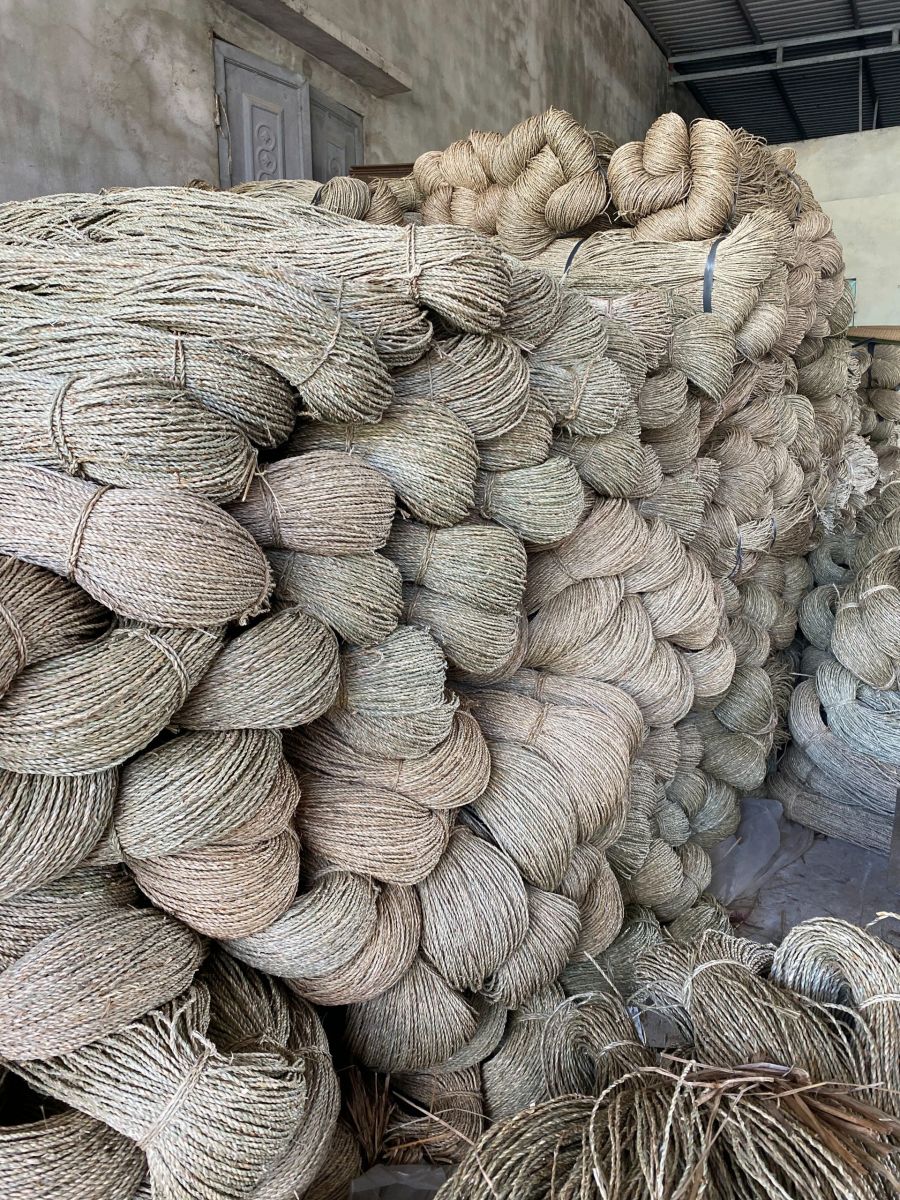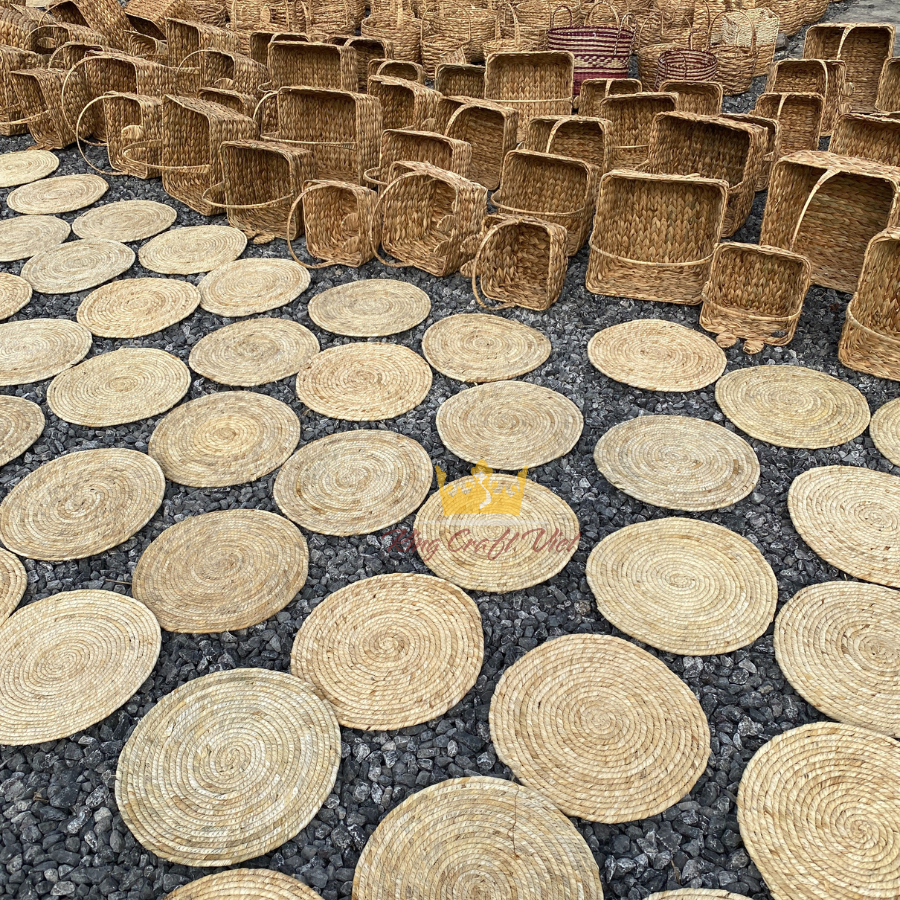The global appeal of natural woven handicrafts continues to surge, driven by their inherent aesthetic charm, practical functionality, and eco-conscious nature. These products beautifully reflect the fusion of traditional artistry with contemporary sustainability values, establishing them as a top-tier choice for both discerning businesses and individual consumers. Whether you are a retailer aiming to enrich your inventory or an entity planning substantial bulk purchases, a thorough understanding of the defining key qualities of high-caliber woven handicrafts is paramount. This comprehensive guide meticulously delves into the essential characteristics that distinguish superior woven products and offers invaluable insights for making well-informed bulk procurement decisions, particularly when seeking a reliable handicraft supplier or a reputable Vietnamese handicraft wholesaler.
High-Quality Materials: The Foundation of Durability and Beauty
The very foundation of any truly exceptional woven handicraft lies unequivocally in the quality of the raw materials employed in its creation. Commonly, skilled artisans expertly utilize natural fibers such as resilient rattan, versatile bamboo, durable seagrass, and fast-growing water hyacinth. These materials are highly valued for their inherent strength, remarkable flexibility, and captivating natural charm. However, it is crucial to recognize that not all raw materials are created equal. High-quality fibers should exhibit a consistent and uniform texture, be entirely free from any splits, discoloration, or other imperfections. For instance, the rattan meticulously used in crafting elegant lampshades should undergo thorough treatment processes to ensure optimal moisture resistance and long-term durability, thereby making it perfectly suitable for both interior and exterior applications.
Sustainability emerges as another absolutely critical consideration when rigorously assessing the quality of materials. Responsibly sourced fibers make a significant contribution to environmental preservation efforts and hold considerable appeal for the ever-expanding market of environmentally conscious consumers. Bamboo, for example, stands out as a highly renewable resource characterized by its rapid growth rate, positioning it as an ideal and sustainable choice for crafting exquisite handicrafts. Furthermore, the implementation of effective treatments to enhance the materials' natural resistance to mold, pests, and humidity is paramount in ensuring the extended longevity of the final products, particularly in regions characterized by challenging climatic conditions. When seeking a Vietnamese handicraft wholesaler, inquire about their sourcing practices.

Superior Craftsmanship: Turning Materials into Masterpieces
The realm of craftsmanship is where true artistry and skill converge, transforming raw, natural materials into intricate designs that seamlessly blend inherent beauty with practical utility. Superior craftsmanship is readily characterized by tightly and consistently woven patterns, impeccably uniform designs, and flawlessly neat finishes. These essential qualities collectively ensure that the resulting products are not only visually stunning and aesthetically pleasing but also remarkably durable and inherently practical for everyday use.
For instance, a high-quality tray or a sturdy basket should exhibit a perfectly balanced structural integrity, complete with reinforced joints and meticulously finished edges. Any decorative elements incorporated into the design, such as carefully dyed patterns or delicate embellishments, should be seamlessly integrated without in any way compromising the overall functionality of the piece. When rigorously evaluating potential products, meticulously look for symmetry and uniformity as reliable indicators of exceptional craftsmanship. Establishing partnerships with handicraft suppliers who maintain close collaborations with highly skilled artisans can effectively guarantee consistent quality across their entire product range.
Versatile Designs: Catering to Diverse Consumer Needs
In today’s dynamic and evolving marketplace, design versatility has become an absolutely essential attribute. While traditional patterns undeniably hold a timeless and enduring appeal, a significant portion of contemporary consumers actively seeks innovative designs that seamlessly align with modern lifestyles and interior design trends. Functional items such as elegant placemats, practical storage baskets, and stylish lampshades are particularly popular choices, as they effectively serve both decorative and practical purposes within the home. Innovative shapes, minimalist patterns, and natural color palettes further enhance the appeal of these products, making them ideally suited for a wide range of interior styles, from rustic and bohemian to sleek and contemporary.
Customization represents another crucial aspect of design versatility that adds significant value to bulk purchases. Handicraft suppliers who offer tailored design options empower businesses to effectively align products with their unique brand identity or cater specifically to the nuanced preferences of their target customer base. For instance, businesses specifically targeting luxury markets might request intricately designed storage baskets or bespoke rattan furniture pieces that possess a distinctive and standout appeal. A reliable Vietnamese handicraft wholesaler should offer customization options.

Durability: Ensuring Long-Term Satisfaction
Durability stands as a critical factor that directly influences customer satisfaction and the overall perceived value of woven handicrafts. High-quality items should be capable of withstanding regular use and exposure to various environmental conditions without experiencing any significant loss of their original shape or intended functionality. Outdoor items, such as stylish garden furniture or durable planters, must undergo specific treatments to effectively resist the damaging effects of prolonged sunlight exposure, rainfall, and fluctuations in temperature. Reinforced weaving techniques and robust overall construction significantly contribute to the product’s inherent ability to endure typical wear and tear over extended periods.
When sourcing products in substantial bulk quantities, it is particularly important to thoroughly assess their durability through comprehensive sampling procedures. Rigorously testing items under typical usage conditions helps to definitively ensure that they consistently meet the required quality standards. Durable products not only significantly enhance customer satisfaction levels but also effectively reduce the likelihood of product returns or customer complaints, ultimately benefiting your business’s reputation and bottom line in the long term. Look for a handicraft supplier known for durable goods.
Ethical and Sustainable Practices: Aligning with Consumer Values
Consumers are increasingly drawn to products that reflect ethical production and sustainability. Many natural woven handicrafts are crafted by artisans in rural communities, providing them with stable incomes and preserving traditional skills. When sourcing these items, prioritize suppliers who uphold fair wages, safe working environments, and environmentally friendly practices.
For example, using natural dyes and minimizing waste during production enhances the product’s eco-friendly appeal. Collaborating with suppliers committed to ethical practices ensures that your purchases contribute positively to both social and environmental goals. This story of sustainability can also be leveraged as a powerful marketing tool to attract conscious consumers.
Consistency in Quality: A Must for Bulk Purchases
Maintaining consistency in quality is vital when purchasing in bulk. Variations in craftsmanship, materials, or finishes can result in dissatisfaction and harm your reputation. Reliable suppliers implement stringent quality control measures to ensure uniformity across their products. Sampling is a crucial step to verify quality before placing large orders. Look for suppliers who provide detailed product specifications and adhere to them strictly.
Consistency builds trust with your customers, streamlines your operations, and reduces the risks associated with bulk buying. A dependable supplier not only delivers high-quality products but also fosters a long-term business relationship.
Packaging and Shipping: Protecting Your Investment
Proper packaging and shipping are essential for preserving the quality of woven handicrafts during transit. Natural materials can be delicate and prone to deformation or damage if not handled correctly. Suppliers should use protective packaging, such as bubble wraps, padded boxes, or moisture-resistant covers, to safeguard products during shipping.
Eco-friendly packaging options, such as biodegradable wraps or recycled materials, align with the sustainable nature of woven handicrafts. Working with suppliers experienced in handling bulk shipments ensures timely and secure delivery, minimizing potential disruptions to your supply chain.
Pricing and Value: Balancing Cost with Quality
While price is a significant factor in bulk purchases, it should not come at the expense of quality. Transparent pricing that includes a breakdown of material, labor, and logistics costs allows you to make informed decisions. Opting for the cheapest option might result in subpar products that fail to meet expectations.
Negotiating volume discounts and establishing long-term partnerships with reliable suppliers can lead to cost savings without compromising on quality. Such relationships also provide added benefits, such as priority service and access to exclusive product lines or new designs.
Partnering with King Craft Viet for Premium Woven Handicrafts
At King Craft Viet, we are dedicated to delivering exceptional natural woven handicrafts that embody all the qualities outlined in this guide. Our product range includes intricately designed rattan lampshades, durable seagrass baskets, and versatile bamboo trays, all crafted with sustainability and quality in mind.
We source our materials responsibly, collaborate with skilled artisans, and adhere to rigorous quality control standards to ensure that every product meets your expectations. By choosing King Craft Viet company as your supplier, you gain access to premium-quality products while supporting traditional craftsmanship and sustainable practices. Contact us to explore wonderful handicraft decor items with the best service!





